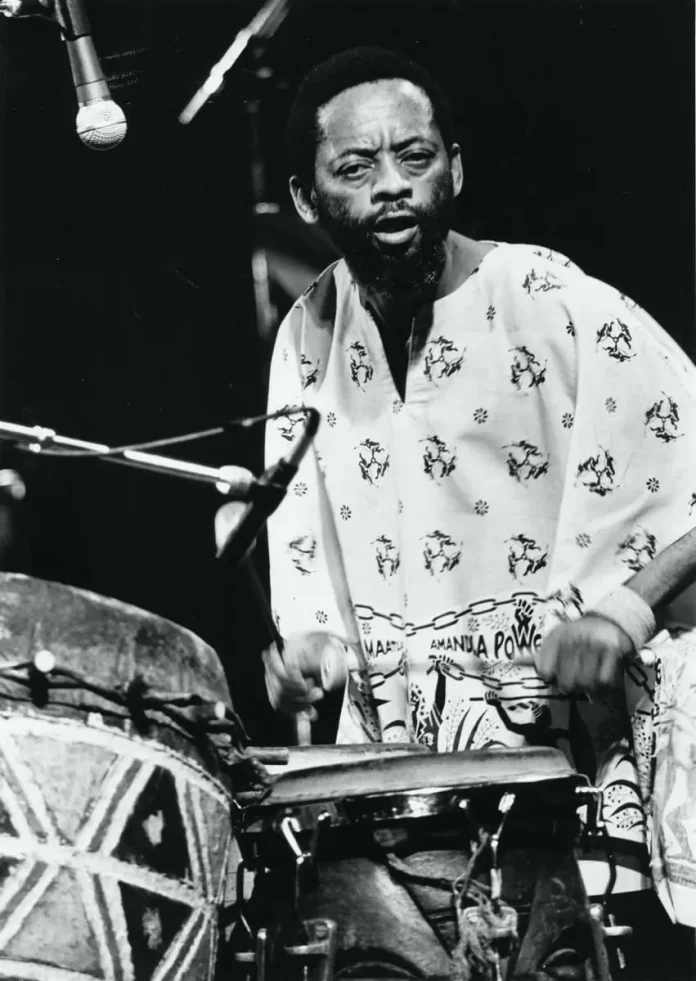The South African musician and political activist Julian Bahula died, aged 85, on 1 October 2023, after a short battle with cancer. Julian was born in Eersterust, Pretoria in 1938, his family later forcibly removed to Mamelodi township. A founding member of the Malombo Jazz Ensemble, with guitarists Philip Tabane, Lucky Ranku and flautist Abbey Cindi in the 1960s, he established himself as a powerful and energetic drummer, using traditional malombo drums.
“We came with a different thing that sounds traditional and turned into a jazz thing,” he was later to say. “Our sound was more raw… Most musicians, they were copying American jazz music… We wanted to come with something original from Africa, based in what our forefathers were doing.” Reissues of the Malombo Jazz Makers albums were reviewed in Jazz Journal in July 2023.
He moved to Europe with the multi-racial band Joburg Hawk in the early 70s, settling in London in 1973 where he formed the band Jabula and helped to galvanise the following for South African music.
In 1975 he joined forces with saxophonist Dudu Pukwana, releasing the critically acclaimed Thunder In Our Hearts album, and combining their groups into Jabula Spear. Other members included Mongezi Feza, Lucky Ranku, Ernest Mothle and James Mene. About the same time he formed Tsafrika Productions to promote African music, used his music to raise awareness about apartheid and the imprisonment of political activists, and fundraised for the exiled African National Congress.
“I told [the ANC] that the way forward was to use music as a weapon. With music, you could draw bigger crowds… People want to listen to the music and then they will hear what you have to say, will listen to what is happening to people in our country.”
In 1983 he collaborated with Mike Terry of the Anti-Apartheid Movement to put on the very first “Free Nelson Mandela Concert”. Held at Alexandra Palace, London, it was scheduled to coincide with Mandela’s 65th birthday and Bahula invited Hugh Masekela to headline the event.
He promoted many other projects for community and ethnic groups in London, booking high-profile artists such as Fela Kuti, Miriam Makeba, Youssou N’Dour, Archie Shepp and Masekela, and establishing a regular Friday-night African night at the 100 Club.
His band Jazz Afrika, which included Ranku, Dill Katz and Dave Chambers, was widely active and appeared on several occasions at the Seven Dials Jazz Club in Covent Garden. As organiser of that club at the time, I found him warm, likeable and enthusiastic. He was straightforward to work with, but his past experiences made him understandably wary in his business dealings.
Like many exiled South Africans, he returned after the regime change. Recognition for his tireless work came in 2012, when he was presented with the Order of Ikhamanga (Gold) by former South African president Jacob Zuma for his “exceptional contribution to and achievement in the field of music and the arts and the struggle for a free and democratic South Africa”.
Ever realistic, Julian was to say “It was a good thing to be honoured – mostly for fighting for freedom,” but he was concerned at the direction in which his country was going.
Julian is survived by his wife, Pinky Miles-Bahula, and Jazz Journal sends sincere condolences to her and the family.
Julian Sebothane Bahula, 13 March 1938 – 1 October 2023.
















